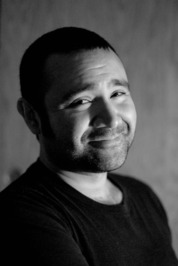 Victor David Giron runs Curbside Splendor, an indie publisher based in Chicago. In part one of Joe Wallace’s interview with Giron he asked about writing fiction in general, his book Sophomoric Philosophy, and the struggle a new fiction writer faces when trying to find a voice. In the second part of our discussion, Giron explains his publishing work, and offers some sound advice to aspiring fiction writers.
Victor David Giron runs Curbside Splendor, an indie publisher based in Chicago. In part one of Joe Wallace’s interview with Giron he asked about writing fiction in general, his book Sophomoric Philosophy, and the struggle a new fiction writer faces when trying to find a voice. In the second part of our discussion, Giron explains his publishing work, and offers some sound advice to aspiring fiction writers.
FZ: Tell us about Curbside Splendor–you obviously see farther than publishing your own work, what’s the challenge of juggling your own PR and marketing with the needs and demands of putting out other people’s material, too.
Victor David Giron: I started Curbside Splendor originally just to publish Sophomoric Philosophy, when I realized one could do such a thing.
Being someone that likes business, I thought it would be neat challenge to try and understand the publishing process. During the process of working with the editor, the designer, a friend that did the artwork for it, I took a liking to publishing and decided to start publishing work by others on the Curbside site.
It also seemed that if publishing the book through Curbside Splendor was going to ever be marginally successfully, I needed to make Curbside a true publisher and not just my own vehicle. I now really enjoy reading submissions, finding ones that fit, and then making them look beautiful and presenting them to other readers. We’re now just releasing our first semi-annual print journal, a collection of short stories and poetry, and are preparing our next release, a chap book of poems by Chicago native Charles Bane Jr.
It’s a challenge, for sure, to juggle marketing the work of others with my own. But I now see myself as just one of many Curbside contributors, and am as, if not more, eager to promote the work of the other contributors, because I genuinely enjoy it. In this sense Curbside has grown much large than being my own project and I plan to continue making it be so.
You see both sides of the publishing world, so an aspiring writer is going to want to know–how does your publishing experience inform your work as an author in terms of making it as a professional fiction writer?
More than anything I’ve learned that you can’t commit to fiction writing unless you absolutely love it and are willing to do it without any guarantee of ever getting paid, let alone financially surviving from it. Even as a small publisher, you publish because it’s something you want to do, period. If you’re willing to do that, and are willing to engage in a collaborative community, there are huge rewards, though perhaps not so much in a monetary sense.
And you have to have a ton of patience, be able to accept rejection, after rejection, after rejection, and be willing to keep trying. That only comes after working on your writing to make it as honest and good as you can, and having confidence in it.
What’s the best advice you were ever given about writing and publishing? And what advice do you have to offer with the shoe on the other foot, so to speak?
When I was working with R.A. Miller on Sophomoric Philosophy, I asked him if I should be concerned with how autobiographical the novel was. I had even contemplated publishing it under a pseudonym. He told me “Dude, 95% of the stuff you read that’s called ‘fiction’ is based on someone’s real life. You either you accept that and move on, or you don’t move forward with the project.”
It then made me think of how so many of the books I’ve loved are autobiographical in nature as well, and it made me feel comfortable with getting behind the book and publishing it. So I guess I’d share that same advice with an aspiring author, to not be afraid and work with your own personal experiences to craft your work. We all have interesting stories to tell, and it’s only natural to hone them and present them in a way that other’s will relate to and enjoy reading.
Don’t force your voice into some genre just because you feel it’s necessary in order to be commercially successfully. Let your literary voice be your own.


 I’m a sucker for nautical stuff. I grew up sailing in Massachusetts, and as Arizona desert rats, our family heads out to Californian waters as often as we can — and thanks to my laptop, I can even do freelancing aboard when necessary. Last week, we sailed back from Catalina Island to Long Beach, California, after a few days of spring break. It’s about 25 miles, usually with a decent breeze. Under good conditions you can see the mainland the entire 4 to 5 hour trip.
I’m a sucker for nautical stuff. I grew up sailing in Massachusetts, and as Arizona desert rats, our family heads out to Californian waters as often as we can — and thanks to my laptop, I can even do freelancing aboard when necessary. Last week, we sailed back from Catalina Island to Long Beach, California, after a few days of spring break. It’s about 25 miles, usually with a decent breeze. Under good conditions you can see the mainland the entire 4 to 5 hour trip.
